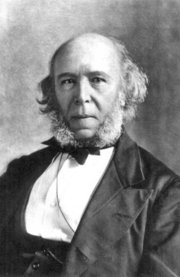Survival of the fittest
|
|

Survival of the fittest is a phrase which is a shorthand for a concept relating to competition for survival or predominance. Originally applied to economics by Herbert Spencer, Spencer drew parallels with Charles Darwin's theories of evolution by what Darwin termed natural selection. The phrase is essentially a metaphor and is often felt to be unhelpful - biologists almost exclusively use natural selection in preference. Some have argued that it is a tautology, since if "fitness" is measured in terms of survival, the phrase becomes "survival of the survivors". Fitness however is a measure of reproduction within population genetics.
| Contents |
History of the phrase
The phrase "survival of the fittest" was first used by the British economist Herbert Spencer in his 1851 work Social Statics, relating to free market economics. Companies which offer better goods and services survive better in the marketplace and tend to accumulate an ever-growing market share. Poorly-adapting companies will be forced out by better-adapting ones: "killed" by the competition.
In the first five editions of The Origin of Species, Charles Darwin used the phrase natural selection [1] (http://216.239.59.104/search?q=cache:3sDItKUzLPwJ:www.uni-kassel.de/fb19/plantphysiology/wallace.pdf+%22survival+of+the+fittest%22&hl=en) and preferred that phrase. However, Spencer drew parallels between his economic theories and Darwin's biological ones and applied the phrase to biology. The phrase was used by Darwin in the 6th edition of The Origin, in a secondary header of Chapter 4 about natural selection [2] (http://www.bartleby.com/11/4001.html) and at several places in the text, mostly using the phrase "Natural Selection, or the Survival of the Fittest". He gave full credit to Spencer, writing "I have called this principle, by which each slight variation, if useful, is preserved, by the term natural selection, in order to mark its relation to man's power of selection. But the expression often used by Mr. Herbert Spencer, of the Survival of the Fittest, is more accurate, and is sometimes equally convenient.". At this time the word "fittest" would have primarily meant "most suitable" or "most appropriate" rather than "in the best physical shape".
In modern times, however, the phrase is widely used in popular literature as a catchphrase for any topic related or analogous to evolution and natural selection. It has thus been applied to principles of unrestrained competition, and it has been used extensively by both proponents and opponents of Social Darwinism.
Many evolutionary biologists criticize how the term is used by non-scientists and the connotations that have grown around the term in pop culture. The phrase also fails to convey the complex nature of natural selection and modern biologists prefer and almost exclusively use the term natural selection in preference. However, the term fitness has come to have a specific meaning within models of population genetics.
Is "survival of the fittest" a tautology?
"Survival of the fittest" is often claimed to be a tautology (i.e. it is a statement which is true by its own definition (see circular reasoning), and is therefore fundamentally uninformative). This is the case if fitness is measured in terms of survival.
The first reaction to this is that "survival of the fittest" is a poor way to think about evolution and most modern biologists prefer and almost exclusively use the term natural selection in preference. They also adopt a gene-centric view of evolution.
Secondly however, a tautology is only a tautology if it is trivially true, yet at there have been theories arguing that the fittest perish. In 1866, seven years after the publication of The Origin, American palaeontologist Alpheus Hyatt, who followed Lamarckism, proposed that lineages in the fossil record go through stages of youth, maturity, old age and death.
"Survival of the fittest" and morality
Many opponents of the evolution theory, particularly those who find that it offends their morality or religious precepts (see creationism) argue that "survival of the fittest" is a justification for violence and cruelty. This however may be analysed in terms of the naturalistic fallacy — just because something is true does not necessarily make it right.
However, there have been those who have tried to use evolution as justification for pseudoscientific ideas such as eugenics, but which are not supported by evolutionary theory.
External links
Tautology links
- Darwin's Untimely Burial (http://www.stephenjaygould.org/ctrl/gould_tautology.html) by Stephen J. Gould
- Evolution and Philosophy: A Good Tautology is Hard to Find (http://www.talkorigins.org/faqs/evolphil/tautology.html) by John Wilkins, part of the talk.origins archive.
- CA500: "Survival of the fittest is a tautology" (http://www.talkorigins.org/indexcc/CA/CA500.html) from the talk.origins index to creationist claims by Mark Ridley.
- Is "survival of the fittest" a tautology (http://www.don-lindsay-archive.org/creation/tautology.html) by Don Lindsay.
Morality links
- CA002: Survival of the fittest implies that "might makes right" (http://www.talkorigins.org/indexcc/CA/CA002.html)
- http://www.anselm.edu/homepage/dbanach/dnr.htm
- Evolution and philosophy - Does right make right? (http://www.talkorigins.org/faqs/evolphil/social.html) by John S. Wilkins.
- "Survival of the fittest" (http://www.worldnetdaily.com/news/article.asp?ARTICLE_ID=23533) by Alan Keyes.
- Darwinism and Laissex-Faire Capitalism (http://www.icr.org/pubs/imp/imp-333.htm) from the Institute for Creation Research
